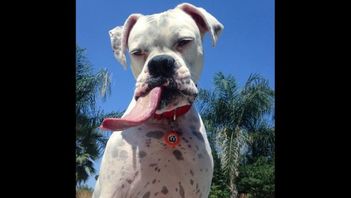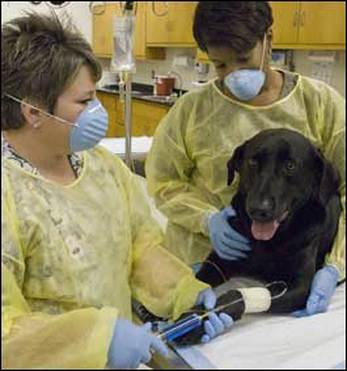 A deaf white boxer and her unusually long tongue are helping to raise awareness and bring positive attention to shelter animals and animals with disabilities, Fox 11 reported. Semi, who was adopted by Farrah Marx in 2012, is currently on her way to Instagram fame as Marx chronicles what it is like to train a deaf dog. “I did a little research on training deaf dogs, but for the most part it was her trust in me and our relationship that made everything work out smoothly,” Marx told Fox 11. “We use hand signals— we have one for ‘Good job’ so that she is always validated when she does something good, ‘no’ or ‘stop that,’ ‘sit,’ ‘stay,’ ‘lie down’ and ‘shake hands.’” Marx told the news station that one of the biggest challenges she faces is when Semi is acting stubbornly and won’t make eye contact. Semi is also featured on socks as part of a campaign to raise fund for shelter dogs. Marx is planning on having her tongue measured to see if she has the Guinness record for World’s Longest Dog Tongue. Marx told Fox 11 her experience with Semi has been incredible, and she is growing into a fully adaptive dog. Source: FoxNews.com A Peaceful Farewell provides compassionate at home pet euthanasia to fellow pet owners in Chandler, Gilbert, Mesa, Tempe, Ahwatukee, Scottsdale, and most of the Greater Phoenix Metropolitan Area.
0 Comments
 HALO's Doggy Dash will benefit the dogs and cats at HALO Animal Rescue. Dogs like Utopia, a Shih Tzu mix, who was badly matted and suffering from a cough. We groomed Utopia and gave her antibiotics to heal her cough. And most importantly of all, we helped her find a forever home. But there are still hundreds of animals like her who need our help. This dog-friendly 5k run/walk will be fun for the whole family. Your registration fees will benefit the animals and your friends and family can donate in honor of your run. Race Day Details:
Click HERE to register to participate! A Peaceful Farewell provides compassionate at home pet euthanasia to fellow pet owners in Chandler, Gilbert, Mesa, Tempe, Ahwatukee, Scottsdale, and most of the Greater Phoenix Metropolitan Area.
 Fun Facts About Dogs
A Peaceful Farewell provides compassionate at home pet euthanasia to fellow pet owners in Chandler, Gilbert, Mesa, Tempe, Ahwatukee, Scottsdale, and most of the Greater Phoenix Metropolitan Area.
 IGGY Iggy recently arrived at Maricopa Animal Care and Control as a stray. Although his dog tag provided his name and phone number his former owners unfortunately no longer wanted him as they told MACC staff not to call again when they attempted to reunite Iggy with his family. Iggy is now looking for a new loving family. Please contact MACC's PetSmart Charities Everyday Adoption Center at 4380 N. Miller Road in Scottsdale. For more details visit www.maricopa.gov/pets. Source: AZCentral.com / Photo: DeeDee Purcell A Peaceful Farewell provides compassionate at home pet euthanasia to fellow pet owners in Chandler, Gilbert, Mesa, Tempe, Ahwatukee, Scottsdale, and most of the Greater Phoenix Metropolitan Area.
 There are at least three lost dogs or “adopt me please!” posts on my Facebook news feed every week. Feeling guilty and clicking “share” was about the extent of the Internet’s ability to help, at least until the Finding Rover app came along. Now those adorably tear-wrenching photos can be put to better use. Finding Rover is an app for mobile and web that lets you upload a picture of your dog, and uses facial recognition to separate your mutt’s mug from others that look like him, but aren’t him. The app reports 98 percent accuracy. All you need is a front-facing shot of your pet that catches a good image of their eyes and nose, the most important features in figuring out whose face is whose. The app then searches photos in the location range to find a matching pet. The automatic search range is five miles, but users can extend that to 2,000 miles if they think their dog might have roamed far afield. People who find a lost dog can take a photo either within the app or from their photo album and upload it to Finding Rover. The app will compare it to photos uploaded by shelters or users that have found (as opposed to lost) a dog. The app will notify the owner of possible matches via a social media photo alert or push notification. Digital lost-and-found dog posters appear on an interactive map in real time. The owner can then contact the caring soul that found their pet and arrange for pick-up. The Oakland Press spoke to Bob Gatt, manager of the Oakland County Animal Control Division (OCACD), who said “Finding Rover will revolutionize how we return lost dogs to their owners. We really encourage every dog owner to upload a photo of their dog to this free app.” OCACD plans to register every dog that comes into the shelter on Finding Rover, making it easy for people to search for their lost pets. People looking to adopt can also search these photos for a likely new friend as easily as people trying to find an old one. Lost dog posters hanging on a bulletin board struck a chord with John Polimeno, CEO and founder of Finding Rover, and he made the connection with the people around him — who were all engrossed in their phones. He spent more than two years working with the University of Utah software development center creating Finding Rover’s proprietary facial recognition tech. He launched Finding Rover on the Apple store in late 2013, and followed with Android and web versions in early 2014. Specialists maintain the Finding Rover software on a daily basis, and people add dogs every day. “We want to do everything we can to safeguard our dogs from being lost forever,” Polimeno said. “A dog is a beloved family member, and if he or she goes missing, it can be devastating to everyone involved.” According to CBS Miami, five people have already found their dogs thanks to Finding Rover. Miami-Dade Animal Services was the first shelter in Florida to hop on board with the free app. The county began uploading its database of dogs in March. The first dog to be reunited with her owner was discovered already waiting in the shelter. Montgomery Country Animal Resource Center in Dayton, Ohio partenered with Finding Rover in July, and one of their recent success stories reunited a dog with his owner the same day that owner discovered the dog missing. Finding Rover is now available in the U.S., Canada, New Zealand and Australia, with more countries to come. After reaching out to Finding Rover, DT learned they’re hard at work on applying the technology to cats, and will keep us up to date on the new release. Source: KPHO News (Aliya Barnwell) / digitaltrends.com A Peaceful Farewell provides compassionate at home pet euthanasia to fellow pet owners in Chandler, Gilbert, Mesa, Tempe, Ahwatukee, Scottsdale, and most of the Greater Phoenix Metropolitan Area.
 Humans with terminal cancers or with widespread metastases are offered treatment with the hope of an extended lifespan, despite a grim prognosis. People are routinely administered second, third, fourth, and beyond treatment plans when they fail to respond to the frontline therapies. This is done with little to no evidence-based information that would suggest such interventions will actually result in a positive outcome. The benefit of aggressive therapy in patients with terminal cancers is poorly described. The American Society of Clinical Oncology (ASCO) identified chemotherapy use among patients for whom there was no clinical value as “the most widespread, wasteful, and unnecessary practice in oncology.” When I read those words as a veterinary oncologist, I had only one thought. Ouch. The majority of patients I treat with cancer will ultimately succumb to their disease. Pets are typically diagnosed at an advanced stage of disease, and a cure is nearly impossible. We also accept much lower rates of toxicity with our chemotherapy protocols than our human counterparts; therefore, with good reason, we can’t treat animals’ cancers to the “fullest potential.” I would estimate that the premise of treatment for greater than 90% of cases I see is rooted in palliation (i.e., relief from pain) rather than a true belief of cure. Yet, veterinary oncology is fundamentally based on principles of human oncology. So if the data for human oncology tells us that the treatment of terminally ill cancer patients is not only poorly beneficial but also wasteful (in terms of not only finances but resources), how can I justify the recommendations I make each day? The answer is simple: Veterinary oncology is premised on the idea of treatment making our patients feel better, not worse. Rarely are animals diagnosed with cancer incidentally. Most show some sort of clinical signs prior to their diagnosis of cancer. Treatment, therefore, is aimed at relieving such signs and returning their quality of life to their baseline level. A study recently published in the Oncology edition of the Journal of the American Medical Association examined the evaluation of the use of chemotherapy and quality of life for people with end-stage cancer. Specifically, researchers were interested in knowing whether chemotherapy had a positive or detrimental effect during the last week of life for human patients with cancer, and if the effect was dependent on the patient’s overall health status prior to treatment. In people, performance status is used to evaluate a patient’s quality of life. There are several different scoring systems, with the Eastern Cooperative Oncology Group (ECOG) being widely accepted and outlined as follows: In the aforementioned study, a patient’s quality of life near death (QOD) was measured using a validated caregiver’s rating of their mental and physical distress during their final week of life. Results from the study raise several interesting points:
Despite the shared foundation of human and veterinary oncology, there is an enormous disparity between the end goals of each discipline. Human oncology is based on the concept of treating patients with the mantra of “life at all costs,” while veterinary oncology accepts our limitations, choosing to “maintain or improve quality of life” over cure. This is the message I attempt to relay during each new consultation I see. This is the information I am passionate about dispersing with my written and spoken dialogue each day. This is why I work so hard to help animals and their owners at every possible junction I am afforded. The battle to dispel the misconceptions about cancer care in animals is never-ending but worth enduring, knowing I can make a difference if even for just a few. Especially if the few are those who feel the “ouch” factor mentioned above just a bit deeper than all the others. Source: Pet MD / Dr. Joanne Intile A Peaceful Farewell provides compassionate at home pet euthanasia to fellow pet owners in Chandler, Gilbert, Mesa, Tempe, Ahwatukee, Scottsdale, and most of the Greater Phoenix Metropolitan Area.
|
The PAW Blog...
For the LOVE of Pets The goal of this blog is to help educate pet owners by sharing pet health facts and pet news articles...and ... sometimes put a smile on your face with a cute or funny pet story! Categories
All
Archives
July 2024
Search for any topic...
|

 RSS Feed
RSS Feed

